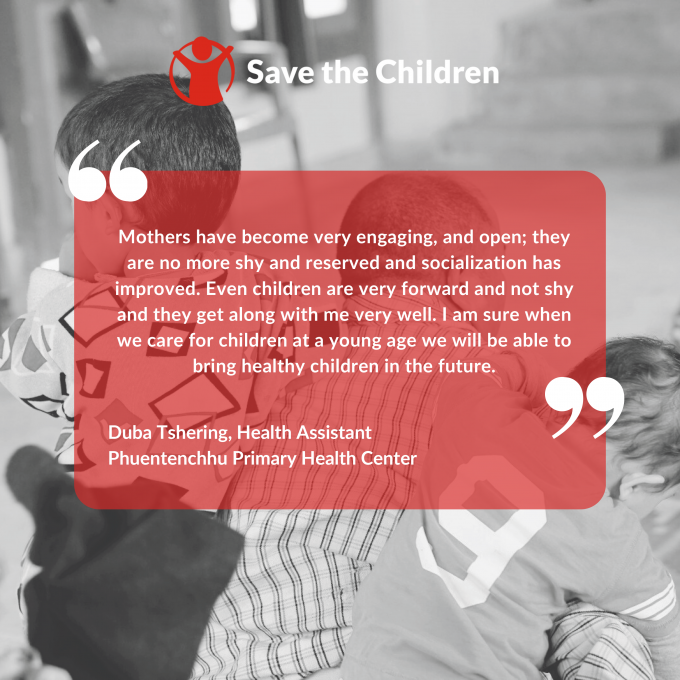 Bhutan
Bhutan
Languages
I see changes

Name of storyteller: Duba Tshering, Health Assistant
Project and location: Prescription to Play (P2P) Phuentenchhu Primary Health Center, Tsirang District
I was first involved with the 3-5 year parenting program at home where parents and caregivers of children 3-5 years who did not have access to an ECcentreter were given a parenting program so that their children could learn something before they become ready for PP. That time around there was no program for children under three years. Now the C4CD plus program is being implemented in the 20 districts I have been fortunate to be the ToT and get trained on delivering the 12 group sessions to caregivers of children under three years. I am also trained in PDSA which is focused on improving program delivery. My role was conducting the community sensitization to parents caregivers and other stakeholders on the importance of ECD, conducting group sessions and developmental milestone screening recommending doable activities to children who have developmental delays and referring children with delays that are ‘red flags” to the district hospital for further assessment.
Firstly through the various training, my knowledge of early childhood development has increased. In the health centres, we normally carry out routine tasks such as providing primary health care services including treating common illnesses, immunization, growth monitoring, community sensitization etc. and do not conduct/deliver sessions as in C4CD plus. C4CD plus sessions are more child development focused, crucial for stimulating brain development which will contribute to the healthy development of children and lessen the burden on primary care health services that we are providing now. Having trained in C4CD plus our capacity to talk to parents and other stakeholders on ECD has greatly enhanced.
Furthermore, I have seen a lot of changes in the mothers of children under three years old such as how they interact now as compared to the first introductory session. When we said we could talk and play with children as early as newborns they used to laugh and be surprised and take it as a joke. After attending more sessions they now believe it is true. Similarly, mothers have also become very engaging, and open and they are no more shy and reserved and socialization has improved. Even children are very forward and not shy and they get along with me very well. Children are scared of seeing the health worker because of fear of injection.
Firstly I am happy to be part of the program and through the C4CD plus training for 3-5 years and now 0-3 years old and the PDSA I am prepared to go to the community and encourage parents and carers to tell them about caring for children as early as possible. Most importantly I can deliver the C4CD plus program and carry out the DMS during the session. Secondly, I see a lot of changes in the way parents interact with children, playing and talking to them. Mothers are also forward and children are not shy as you must have seen. Most of the children are not scared of me. Usually, children are scared about immunization and the moment they see us they cry but this is not the case. I am sure when we care for children at a young age we will be able to bring healthy children in the future.
Creating the opportunity for health workers to be trained on early childhood development by MOH and SC and be able to connect with our community besides just doing regular primary health care services. The training resources are useful and we can conduct the sessions with confidence as I have been involved in the 3-5 C4CDplus program I enjoy being with the community. The PDSA can also be useful for improving services in other fields provided by us and not only C4CD plus.